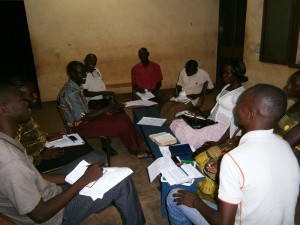My summer holidays in 2012 turned into a bicycle accident, followed by emergency surgery, a two-month recovery period and a further surgery. I found it very hard to find peace about this situation, especially since I was still suffering from the consequences of a more severe accident which happened three years ago.
I said to the Lord, “I know you are good, you are good to everyone, but not to me. I don’t see your goodness in my life. I am following you and serving you, but my body is broken and my heart is broken. Where is your goodness?”
 Sadness, confusion and apathy surrounded me as I walked through this spiritual desert. I could not “fix” myself, nor could other people help me – their words went into my ears, but did not reach my heart.
Sadness, confusion and apathy surrounded me as I walked through this spiritual desert. I could not “fix” myself, nor could other people help me – their words went into my ears, but did not reach my heart.
During these months, it was only through the Bible that I could hear the Lord speaking to me. The Holy Spirit used my decision to read the Bible no matter how I felt or what I thought about myself and God. In my dryness, the Holy Spirit gave me a tiny bit of water to survive each day. I was living only by that water – the Word of God – drinking it little by little.
I read the book of Job. He understood me. He called out to the Lord in his misery and bitterness of soul: “I have no peace, no quietness, I have no rest but only turmoil” (Job 3:26). My anguish and distress were there in the middle of the Bible!
The Lord spoke to me through Psalm 145: I am gracious and compassionate, slow to anger and rich in love (v8). I am good to all (v9). I uphold all who fall and lift up all who are bowed down (v14). I am near to all who call on me, I am near to you. I fulfil the desires of those who fear me; I hear their cry and save them. I watch over all who love me (v18-20).
The Holy Spirit let these words drop deep into my heart: “I am watching over you, I hear your cry and will save you…” Through Scripture I was able to believe again that the Lord is good, he is always good, he is good to everyone, even to me!
Lilit Avayan, IFES General Secretary Armenia
lilitavayan (at) yahoo.co.uk


 themselves into the passage, the Word comes alive to them, touches their own lives, and changes their approach to understanding God’s Word. To be a little bit more creative, acting can also be added in as the students speak scripture. However, the facilitator needs to see whether this will distract or help, as it can sometimes be a hindrance.
themselves into the passage, the Word comes alive to them, touches their own lives, and changes their approach to understanding God’s Word. To be a little bit more creative, acting can also be added in as the students speak scripture. However, the facilitator needs to see whether this will distract or help, as it can sometimes be a hindrance. Over the past years I developed the habit of staying up very late at night. I knew it wasn’t a healthy habit, but I wasn’t too concerned. Eventually, however, I realized that it was affecting me in negative ways. I had a hard time waking up in the mornings. I often felt tired during the day and was always in a rush. This prevented me from having quality time with God and his word. I felt tired, but also restless, desperate for God’s presence and guidance.
Over the past years I developed the habit of staying up very late at night. I knew it wasn’t a healthy habit, but I wasn’t too concerned. Eventually, however, I realized that it was affecting me in negative ways. I had a hard time waking up in the mornings. I often felt tired during the day and was always in a rush. This prevented me from having quality time with God and his word. I felt tired, but also restless, desperate for God’s presence and guidance. 

 Youl Juliette attended the event in Koudougou: “I learnt a lot from this night. I used to often read the Bible in a superficial way, but the different methods used during this night allowed me to ask questions of the text and understand it better.”
Youl Juliette attended the event in Koudougou: “I learnt a lot from this night. I used to often read the Bible in a superficial way, but the different methods used during this night allowed me to ask questions of the text and understand it better.”